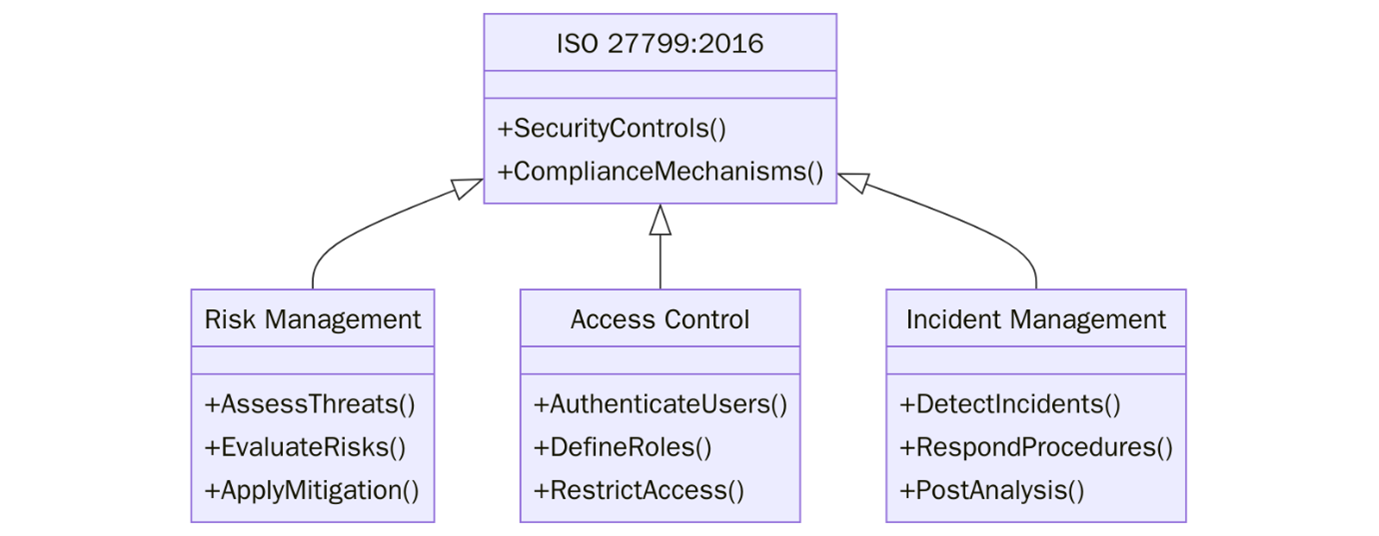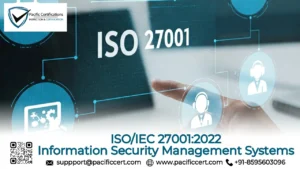What is ISO 27799?
ISO 27799:2016 provides detailed guidance on implementing information security management in healthcare environments, based on the controls defined in ISO/IEC 27002. It ensures that health sector organizations effectively protect personal health information (PHI) and other sensitive data against security threats and non-compliance with health data regulations.

This standard is designed to help healthcare providers and data processors apply ISO/IEC 27001 and ISO/IEC 27002 security frameworks within a healthcare-specific context. It addresses the unique challenges of health informatics, such as patient consent, clinical data integrity, and secure telehealth systems.
If you operate in health information systems or store/process personal health data, ISO 27799:2016 is your key to ensuring data privacy, security, and compliance.
Looking to certify your ISMS in healthcare using ISO/IEC 27001 with ISO 27799 alignment? Contact support@pacificcert.com.
Scope and Applicability
ISO 27799:2016 is intended for all organizations in the health sector that create, manage, or access health-related data, ensuring protection of the confidentiality, integrity, and availability of personal health information (PHI). It applies to entities such as hospitals, insurers, health-tech platforms, EMR/EHR providers, diagnostic centers, telemedicine providers and public health agencies. The standard extends ISO/IEC 27002 by offering specific implementation guidelines for healthcare, addressing sector-specific risks like unauthorized access, ransomware targeting EMRs, and privacy breaches under laws such as HIPAA, GDPR, and national health acts.
Key Definitions in ISO 27799
- Health Informatics: The discipline that integrates IT into healthcare to collect, store, and manage patient data
- PHI (Personal Health Information): Any information related to health status, care provision, or payment that can identify an individual
- Access Control: A security measure ensuring that only authorized personnel can access specific health data
- Risk Assessment: The process of identifying threats, vulnerabilities, and potential impacts on health data systems
- Information Security Controls: Safeguards defined under ISO/IEC 27002, adapted for healthcare environments in this standard
Clause Structure and Link to ISO/IEC 27002
ISO 27799 maps ISO/IEC 27002 controls to healthcare-specific needs, ensuring appropriate implementation in health informatics systems. Below is a representative table showing core areas:
Control Area | ISO/IEC 27002 Reference | Healthcare-Specific Focus in ISO 27799 |
Information Security Policies | Clause 5 | Policies for PHI protection, EHR handling, and clinical system access |
Access Control | Clause 9 | Role-based access, emergency override protocols, patient consent models |
Cryptography | Clause 10 | Encryption for PHI at rest and in transmission |
Physical and Environmental Security | Clause 11 | Securing servers, medical devices, and clinical networks |
Operations Security | Clause 12 | Logging access to EMRs, audit trails for diagnoses, backups of PHI |
Communications Security | Clause 13 | Secure data exchange across hospitals, labs, and third-party providers |
Supplier Relationships | Clause 15 | Managing vendors handling lab data, imaging records, or billing data |
Incident Management | Clause 16 | Breach handling for PHI, patient notification procedures |
Compliance | Clause 18 | Ensuring alignment with GDPR, HIPAA, and local health data protection laws |
Need assistance building an ISO 27001 audit scope using ISO 27799 as a sector-specific control reference? Contact support@pacificcert.com.
What are the requirements of ISO 27799?
ISO 27799 outlines the requirements for managing health information security in alignment with ISO/IEC 27002, specifically tailored to the healthcare sector. It requires healthcare organizations to implement controls that ensure the confidentiality and availability of personal health information. Key requirements include:

- Conduct a health-sector-specific risk assessment based on ISO/IEC 27005 or equivalent
- Apply ISO/IEC 27002 controls with healthcare-specific modifications as outlined in ISO 27799
- Establish a PHI protection policy that includes patient consent, anonymization, and data lifecycle management
- Implement role-based access controls for clinicians, support staff, and external vendors
- Maintain audit trails for all accesses, changes, and deletions of personal health records
- Encrypt sensitive clinical and administrative data, both in storage and during transmission
- Define and test incident response plans for health data breaches, ransomware, and unauthorized access
- Ensure compliance with applicable laws and regulations such as HIPAA, GDPR, or national health privacy regulations
Documentation Required
Organizations implementing ISO 27799 should maintain:
- Risk assessment specific to personal health data systems
- ISO/IEC 27001-aligned Information Security Management System (ISMS) documentation
- Role-based access control lists and authentication policies
- PHI encryption protocols and key management procedures
- Incident management logs and breach notification procedures
- Policies for patient consent, data sharing, and retention
- Audit logs, backup records, and system integrity checks
Want help aligning ISO 27799 with your ISMS or audit scope? Email support@pacificcert.com.
What are the benefits of ISO 27799?
ISO 27799 provides a structured approach to safeguarding personal health information, offering numerous benefits to healthcare organizations and stakeholders. By aligning with ISO/IEC 27002 and adapting it to the specific needs of healthcare, the standard ensures that sensitive health data is protected against breaches and unauthorized access, Below are the key benefits:

- Ensures confidentiality of personal health data by applying tailored security controls
- Enables compliance with national and international health data regulations such as GDPR and HIPAA
- Reduces risk of cyberattacks targeting EHR systems, telehealth platforms, and patient portals
- Aligns with ISO/IEC 27001, enabling integrated ISMS audits in the healthcare sector
- Promotes trust among patients, partners, and regulators through transparent security policies
- Improves incident response and breach handling readiness specific to medical and patient data
- Enhances interoperability and secure data sharing across hospitals, insurance, and diagnostics
- Supports cost-effective implementation by focusing only on controls relevant to health informatics
- Establishes a repeatable model for secure health IT system deployment
- Builds a resilient and compliant digital healthcare infrastructure across private and public sectors
The healthcare industry has become a prime target for cyber threats lately, with a significant rise in ransomware and system hijackings affecting hospitals and patient portals globally. The adoption of telemedicine, mobile health apps, and cloud-based EMR systems has further expanded the digital attack surface.
Future-ready health institutions are using ISO 27799 to align cybersecurity strategy with clinical, operational, and patient safety goals.
Need to future-proof your health information systems with ISO-based audits? Contact support@pacificcert.com.
How Pacific Certifications Can Help?
As a certification body, Pacific Certifications provides accredited audit and certification services for the following systems relevant to healthcare security:
- ISO/IEC 27001 – Information Security Management Systems
- ISO 9001 – Quality Management for health service providers
- ISO 22301 – Business Continuity Management for healthcare operations
- ISO 13485 – Medical Device Quality Systems
- ISO/IEC 27701 – Privacy Information Management (for GDPR alignment)
We can help your organization with:
- Independent ISMS certification audits aligned with ISO 27799
- Audit of health-specific access controls, breach responses, and encryption practices
- Verification of compliance with PHI-handling laws and sector-specific obligations
- Assessment of documentation, risk treatment, and security governance practices
To begin your ISO 27001 certification with ISO 27799 alignment, contact support@pacificcert.com.
FAQ: ISO 27799
Is ISO 27799 certifiable?
It complements ISO/IEC 27001 certification by adapting ISO/IEC 27002 controls for healthcare.
Who should implement ISO 27799?
Hospitals, clinics, health IT providers, labs, and any organization that stores or processes personal health data.
How is it different from ISO/IEC 27001?
ISO/IEC 27001 is a certifiable management system standard. ISO 27799 is a guidance document that adapts ISO/IEC 27002 controls for the healthcare context.
Can ISO 27799 be used to comply with HIPAA or GDPR?
Yes, it supports compliance by mapping security controls directly to healthcare data protection requirements.
Ready to get ISO 27799 certified?
Contact Pacific Certifications to begin your certification journey today!
Suggested Certifications –
Read more: Pacific Blogs






